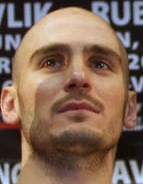Middleweight champ is good, but far from great

Kelly Pavlik was an illusion. The middleweight champion of the world is a good, tough and extremely determined young fighter but was never destined for greatness, even if that thought crossed our minds not long ago.
Bernard Hopkins made that clear in October, when he dominated Pavlik to win a near-shutout decision – Pavlik’s first and only loss.
And don’t blame Pavlik for any misconception. He never said he was a budding superstar. We – the media, the fans, people in the business – were the ones who suggested he could be something special.
We do it all the time. We build fighters up into something they could never live up to and then shake our heads in disappointment when, almost inevitably, they fail.
“I don’t think anyone does it on purpose,” said trainer/television analyst Teddy Atlas. “It’s just the way it is today; people get excited about less now. I think standards are lower than they used to be. ÔǪ
“If someone is pretty good, we say they’re great. We give them high grades very quickly. Of course they come up short.”
Pavlik, who faces Marco Antonio Rubio on Saturday in his first fight after the setback, came up WAY short against Hopkins.
One problem might’ve been the fact they fought at a 170-pound catch-weight. As trainer Freddie Roach pointed out, Pavlik “looked sluggish, lethargic at that weight. He’s much better at 160 pounds.”
And apparently Pavlik was ill at fight time, reportedly with bronchitis, which had to take a toll.
However, the main reason he lost was a disparity in skills – Hopkins had ’em, Pavlik didn’t.
For example, Atlas pointed out that Hopkins was able to land counter rights over Pavlik’s right jab all night because Pavlik was too close to Hopkins when he threw the jab and didn’t move his head.
Pavlik also pulled his head straight back when Hopkins closed in, leaving him on his heels and open to Hopkins’ left hook.
Pavlik could make such mistakes against lesser fighters, such as Jermain Taylor and Edison Miranda, and get away with it but not against someone with Hopkins’ ability and experience.
We should’ve seen it coming.
“Basically, the things he did that night he’s done throughout his career,” Atlas said. “Until that night, though, he didn’t pay the full price. You can say the writing was on the wall. Miranda and other fighters hit (Pavlik) with those punches but he overcame it with determination.
“He broke down Miranda, but Miranda wasn’t as diverse, wasn’t as solid in other areas as Hopkins was. And Pavlik paid a price.”
Atlas won’t describe Pavlik’s skills as “raw,” as some people have. He had about 100 amateur fights, more than enough to learn solid fundamentals. However, he said it’s fair to say that Pavlik is underdeveloped in certain areas, including defense.
Roach described Pavlik as “still young, green” even though he’s 26 years old and has had 35 professional fights, which certainly doesn’t say much for his development.
Thus, one might say he was set up to fail against Hopkins.
“Yeah, possibly,” Roach said. “He had great wins against Taylor; so spectacular. I think that might’ve put him at a level he maybe wasn’t ready for yet. It was a big-money fight, though: Who wouldn’t have gone for it?
“I think he’ll improve but I guess time will tell.”
Can Pavlik correct the mistakes he made against Hopkins?
Not if someone doesn’t teach him, Atlas said, which brings us to another possible problem with Pavlik: his longtime trainer, Jack Loew.
Bob Arum, Pavlik’s promoter, contacted Roach after the Hopkins fight to determine whether the architect of Manny Pacquiao’s run to the pinnacle of boxing would be willing to work with Pavlik, meaning he found Loew deficient in some way.
Roach said that, yes, he’d help Pavlik but never heard from the fighter or his closest handlers. They didn’t feel a change was necessary, insisting on a conference call that “we have boxing skills.”
Still, with the status quo, how much better can Pavlik get?
Atlas acknowledged the possibility that Pavlik and his team will have picked up on his mistakes and make some adjustments – but he has his doubts.
“To be honest, if they were (teaching him these things), then they probably would’ve been taught already,” Atlas said.
To avoid going too far the other direction, in which we’re overly cynical, we should state here that Pavlik IS a good fighter.
As Atlas said, against most opponents, he compensates for any deficiencies with excellent conditioning, a high work rate, a good chin and sheer will power. He can beat almost any middleweight out there.
And even though he suffered the misfortune of having his aura of invincibility shattered by a 43-year-old man, remember, he also benefited from being on the pedestal we created for him.
He became one of the biggest names in the sport, has earned a ridiculous amount of money and is still young enough to accomplish a great deal – even if he never even resembles a great fighter.
“In the end, he probably received more credit than he deserved but he benefited from that,” Atlas said. “He was paid more, he was treated better by the public. It’s just a matter of him coming down to where he belongs.
“Reality hurts a bit. There just aren’t a lot of great fighters around at all, though. That’s just the way it is now.”
Michael Rosenthal's column appears Wednesdays. He can be reached at [email protected]














